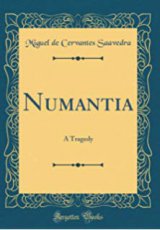The Siege of Numantia Page #6
The Siege of Numantia is a tragedy by Miguel de Cervantes set at the siege of Numantia. The play is divided into four acts. The dialogue is sometimes in tercets and sometimes in redondillas, but for the most part in octaves.
And rash display of valour, past compare, To face in arms the fury and the sword Of these wild rebels, frantic with despair; To shut them in will yield us better fruit, And wither all their courage at the root. 'Tis easy to surround the city quite, Save where the river shows an open line. SCIPIO. Now let us go, and straightway bring to light This little-used and novel plan of mine; Then to the Roman Senate in its might, (If Heaven's smiles but on our project shine,) Will complete Spain be subject, far and wide, By simple conquest of this people's pride. SCENE II. Enters a damsel, crowned with a mural crown, bearing heraldic castles in her hand, signifying SPAIN, and says: SPAIN. Thou Heaven, the lofty, vast, serenely grand, Who, with thy fructifying powers, hast crowned With wealth the chiefest part of this my land, And made it great above the realms around, Let my sad dole excite thy pity bland; And since thou giv'st the wretched calm profound, To me be gracious in my throes of pain, For I am she, the lonely, luckless Spain. Let it suffice thee that, beneath thy care, My powerful limbs in fiercest fires were tossed, And through my heart thou to the sun laidst bare The dark benighted kingdom of the lost. My wealth 'midst thousand tyrants thou didst share; Phœnicians, Greeks as well, in countless host Did part my realms; for thou didst will it so, Or else my wickedness deserved the blow. Is't possible that I should always be Of nations strange the meek and lowly slave, Nor ever have one glimpse of Liberty, Nor ever see my native banners wave? And yet, perchance, it is a just decree, That I should sink beneath a fate so grave, Since my most valiant men and sons of fame Are foes at heart, and brothers but in name. For public ends they never will unite, These brilliant spirits--a divided host; Nay, rather will they stand apart, or fight, When strength and unity are needed most; And thus by fatal discords they invite The wild barbarian hosts, at fearful cost, Who sack their treasures with a greedy glee, And shower their cruelties on them and me. It is Numantia, and only she, Who with her blood her life will dearly sell; Who with her sword unsheathed, and flashing free, Defends the Liberty she loves so well. But now her race is over, woe is me! The hour, the fated hour is on the knell, When she must part with life, but not with fame, Like Phœnix rising fresh from out the flame. Those Romans there, a countless timid band, Who in a thousand ways their conquests seek, Decline to measure swords, and hand to hand, With these brave Numantines, so few and weak. O might their plans be buried in the sand, And all their fancies turn to crazy freak, And this Numantia, this little spot, Regain once more its free and happy lot! But now, alas! the foe hath girt it round, Not with confronting arms, foreboding ill To its weak walls, but with a wit profound And ready hands hath laboured with such skill, That with a trench deep-hollowed in the ground The town is circled, over plain and hill-- And only on the side where runs the river Is there defence against this strange endeavour. So these poor Numantines are close confined And rooted to the spot, as if by charms; No man can leave, no man may entrance find; They have no fear of stormings or alarms; But as they gaze around, before, behind, And see no labour for their powerful arms, With fearful accents, and ferocious breath, They cry aloud for war, or else for death! And since the side the spacious Douro scours, Laving the city in its onward way, Is that alone which, in their evil hours, May lend the prisoned Numantines some stay, Before their grand machines or massive towers Be founded in its stream, I fain would pray The bounteous river, radiant with renown, To aid and succour my beleaguered town. Thou gentle Douro,[5] whose meand'ring stream Doth lave my breast, and give it life untold, As thou wouldst see thy rolling waters gleam, Like pleasant Tagus, bright with sands of gold; As thou wouldst have the nymphs, a merry team, Light-footed bound from meads and groves of old, To pay their homage to thy waters clear, And lend thee bounteously their favours dear; Then lend, I pray, to these my piteous cries Attentive ear, and come to ease my woes. Let nothing hinder thee in any wise, Although thou leav'st awhile thy sweet repose; For thou and all thy waters must arise To give me vengeance on these Roman foes; Else all is over, 'tis a hopeless case, To save from ruin this Numantian race. Enter the river DOURO, with several boys attired as rivers like himself, these being the tributary streams which flow into the Douro. DOURO. O Spain, my mother dear, thy piercing cries Have struck upon mine ears for many an hour, And if I did not haste me to arise, It was that succour lay beyond my power. That fatal day, that day of miseries, Which seals Numantia's doom, begins to lower; The stars have willed it so, and well I fear No means remain to change a fate so drear. Minuesa, Tera, Orvion as well, Whose floods increase the volume of mine own, Have caused my bosom so to rise and swell That all its ancient banks are overflown. But my swift current will not break their spell, As if I were a brook, their pride has grown To do what thou, O Spain, didst never dream, To plant their dams and towers athwart my stream. But since the course of stern, relentless Fate, Brings round the final fall, without avail, Of this thy well-beloved Numantian state, And closes up its sad and wondrous tale, One comfort still its sorrows may abate, That never shall Oblivion's sombre veil Obscure the bright sun of its splendid deeds, Admired by all, while age to age succeeds. But though this day the cruel Romans wave Their banners o'er thy wide and fertile land,-- Here beat thee down, there treat thee as a slave, With pride ambitious, and a haughty hand,-- The time will come (if I the knowledge grave Which Heaven to Proteus taught do understand) When these said Romans shall receive their fall From those whom presently they hold in thrall. I see them come, the peoples from afar, Who on thy gentle breast will seek to dwell,
Translation
Translate and read this book in other languages:
Select another language:
- - Select -
- 简体中文 (Chinese - Simplified)
- 繁體中文 (Chinese - Traditional)
- Español (Spanish)
- Esperanto (Esperanto)
- 日本語 (Japanese)
- Português (Portuguese)
- Deutsch (German)
- العربية (Arabic)
- Français (French)
- Русский (Russian)
- ಕನ್ನಡ (Kannada)
- 한국어 (Korean)
- עברית (Hebrew)
- Gaeilge (Irish)
- Українська (Ukrainian)
- اردو (Urdu)
- Magyar (Hungarian)
- मानक हिन्दी (Hindi)
- Indonesia (Indonesian)
- Italiano (Italian)
- தமிழ் (Tamil)
- Türkçe (Turkish)
- తెలుగు (Telugu)
- ภาษาไทย (Thai)
- Tiếng Việt (Vietnamese)
- Čeština (Czech)
- Polski (Polish)
- Bahasa Indonesia (Indonesian)
- Românește (Romanian)
- Nederlands (Dutch)
- Ελληνικά (Greek)
- Latinum (Latin)
- Svenska (Swedish)
- Dansk (Danish)
- Suomi (Finnish)
- فارسی (Persian)
- ייִדיש (Yiddish)
- հայերեն (Armenian)
- Norsk (Norwegian)
- English (English)
Citation
Use the citation below to add this book to your bibliography:
Style:MLAChicagoAPA
"The Siege of Numantia Books." Literature.com. STANDS4 LLC, 2024. Web. 24 Nov. 2024. <https://www.literature.com/book/the_siege_of_numantia_60>.




Discuss this The Siege of Numantia book with the community:
Report Comment
We're doing our best to make sure our content is useful, accurate and safe.
If by any chance you spot an inappropriate comment while navigating through our website please use this form to let us know, and we'll take care of it shortly.
Attachment
You need to be logged in to favorite.
Log In